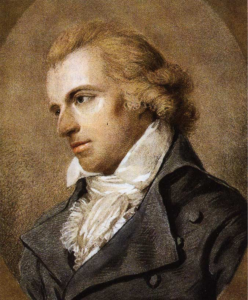To Emma
(Poet's title: An Emma)
Set by Schubert:
D 113
[September 17, 1814]
Weit in nebelgrauer Ferne
Liegt mir das vergang’ne Glück,
Nur an Einem schönen Sterne
Weilt mit Liebe noch der Blick,
Aber wie des Sternes Pracht
Ist es nur ein Schein der Nacht.
Deckte dir der lange Schlummer,
Dir der Tod die Augen zu,
Dich besäße doch mein Kummer,
Meinem Herzen lebtest du.
Aber ach! du lebst im Licht,
Meiner Liebe lebst du nicht.
Kann der Liebe süß Verlangen,
Emma! kann’s vergänglich sein?
Was dahin ist und vergangen,
Emma, kann’s die Liebe sein?
Ihrer Flamme Himmelsglut,
Stirbt sie, wie ein irdisch Gut?
Far off in the cloud-grey distance
Lies my past happiness.
It is only towards one beautiful star
That I still cast a loving look,
But, like the splendour of the star
It is just an apparition of night.
If the long sleep were to cover you
And death were to close your eyes
My grief would still possess you
And my heart would still live for you.
But oh! You live in light,
You do not live for my love.
Can the sweet longing of love,
Emma, can it be transient?
What is past and gone,
Emma, can that be love?
The heavenly glow of its flame,
Does that die like an earthly thing?
All translations into English that appear on this website, unless otherwise stated, are by Malcolm Wren. You are free to use them on condition that you acknowledge Malcolm Wren as the translator and schubertsong.uk as the source. Unless otherwise stated, the comments and essays that appear after the texts and translations are by Malcolm Wren and are © Copyright.
☙
Themes and images in this text:
Clouds Detours and delusions Eyes Fire Gazes, glimpses and glances Grey Hearts Heaven, the sky Light Night and the moon Sleep Stars Time
The past seems not to have passed away. We look back, we recall it, we seem to know it. Can it therefore be truly ‘the past’?
Even the most simple uses of the word ‘past’ become problematic as we think carefully about them. The past tense of course refers to events that are over and done with, dead and gone: she left, I cried, my heart broke. However, it can also be used to create social distance and to increase levels of politeness: ‘can you help me?’ ‘could you help me?’ ‘I was wondering if you could help me?’ It can even be used to refer to an unreal present situation or a hypothetical future eventuality: ‘I wouldn’t do that if I were you’, ‘I don’t know what I might do if she walked in now’. (Schiller uses this very structure at the beginning of stanza 2 here (the verbs in bold are examples of this ‘unreal past ‘):
Deckte dir der lange Schlummer,
Dir der Tod die Augen zu,
Dich besäße doch mein Kummer,
Meinem Herzen lebtest du.
Any past that we recall was not past when we experienced it. We live in a perpetual present, but as Augustine pointed out, as soon as we pay attention to the present moment it has receded into the past. It is ungraspable. A few people might manage to live more with a drive to the future, but many more of us probably live mostly in the past. We may not be conscious of it, but our personalities and cultures were formed in the past and our actions and feelings are predominantly motivated by passions and experiences that are simply no longer ‘here’ or ‘now’.
Schiller caught some of this in the image in the first stanza of casting loving glances at a beautiful distant star and realising that the starlight is an illusion. We think the beauty of the stars has something to do with us, that their glow has some sort of message for us, but a little reflection (or distance) persuades us that this is only fantasy. The speed of light has been measured and so we know that the starlight we are now looking at is actually showing us the star in the past. We cannot even see the sun as it is now, only as it was just over eight minutes ago.
In the third stanza starlight and sunlight are referred to as ‘the flame of heavenly glow’. The conventional distinction between ‘earthly’ transcience and ‘heavenly’ eternity is used to highlight the distance between the earthbound poet and Emma, who now ‘lives in light’. The crucial question is whether the spark that once shot between them has been extinguished, or whether it ignited an eternal flame.
For a flame to be inextinguishable there has to be an endless supply of fuel and oxygen. These surely count as ‘earthly things’ (ein irdisch Gut), so the answer to the poet’s rhetorical question (‘Does the heavenly glow of love’s flame die like an earthly thing?’) might not be what he wants to hear. Maybe love can be transient. Flames do go out when the chemical reactions have run their course.
☙
Original Spelling An Emma Weit in nebelgrauer Ferne Liegt mir das vergang'ne Glück, Nur an Einem schönen Sterne Weilt mit Liebe noch der Blick, Aber, wie des Sternes Pracht Ist es nur ein Schein der Nacht. Deckte dir der lange Schlummer, Dir der Tod die Augen zu, Dich besäße doch mein Kummer, Meinem Herzen lebtest du. Aber ach! du lebst im Licht, Meiner Liebe lebst du nicht. Kann der Liebe süß Verlangen, Emma, kann's vergänglich seyn? Was dahin ist und vergangen, Emma, kann's die Liebe seyn? Ihrer Flamme Himmelsgluth, Stirbt sie, wie ein irdisch Gut?
Confirmed by Peter Rastl with Gedichte von Friederich Schiller, Erster Theil, Leipzig, 1800, bey Siegfried Lebrecht Crusius, page 300, and with Musen-Almanach für das Jahr 1798, herausgegeben von Schiller. Tübingen, in der J.G.Cottaischen Buchhandlung, pages 115-116.
To see an early edition of the text, go to page 236 [242 von 292] here: http://digital.onb.ac.at/OnbViewer/viewer.faces?doc=ABO_%2BZ207858202


